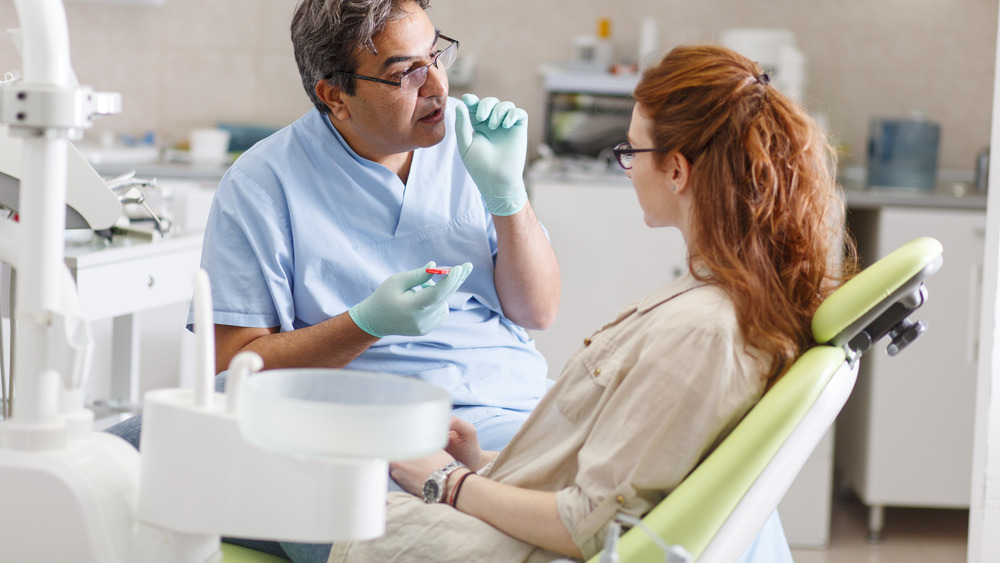Your Teeth Can Reveal Surprising Things About Your Health
If eyes are the windows to your soul, then teeth are the window to, well, everything else about you. Teeth give insight into the past — they've given us clues into the early human diet thousands of years ago and can even help forensic scientists uncover a person's identity. Additionally, a 2019 study in Community Dentistry and Oral Epidemiology found tooth loss in older adults could give signs of childhood trauma.
Tooth be told, there's a lot we can learn from our own mouths — including information about the state of our body. You mouth is home to about 700 species of bacteria, fungi, and germs. While most are relatively harmless, some cause disease by traveling to other parts of the body. Worsening oral health may be evidence of certain diseases or conditions that make the body more prone to illness. Not sure what your teeth are trying to tell you? Here's a look at some of the health conditions your dentist may be able to identify simply by looking in your mouth.
Your teeth can reveal signs of type 2 diabetes
When dentists examine patients' teeth and mouths, they can spot signs of diabetes. Excessive sugar, or glucose, observed in type 2 diabetes can cause oral health issues. According to the National Institute of Diabetes and Digestive and Kidney Diseases, saliva contains glucose, and excessive amounts of it in the saliva causes harmful bacteria to settle in our mouths. Over time, bacteria stick to the food we eat and make sticky plaques that cause tooth decay, cavities, and bad breath.
Gum disease can also be evidence of type 2 diabetes. Cedars-Sinai explained that diabetes weakens the gums and bones by thickening blood vessels and reducing blood flow. Since diabetes weakens the immune system, the mouth is prone to other infections such as periodontal disease, per the American Academy of Periodontology. A 2017 study in BMJ Open Diabetes Research & Care found that people with periodontitis had higher blood glucose levels. They suggest this could be useful for screening for prediabetes.
"When you treat and control diabetes, immediately the condition in the mouth improves. And when you treat periodontal disease, the need for insulin is reduced," Salomon Amar, professor and director at the Center for Anti-inflammatory Therapeutics at Boston University School of Dental Medicine, told WebMD.
Pregnancy changes your body, including your teeth
You could wait a few minutes for a pregnancy test, or you can have your dentist check your teeth. The American Pregnancy Association explained that the hormonal changes caused by pregnancy can weaken the body's ability to ward off harmful bacteria and increase the chance for periodontal infections. The increase in bacteria causes a build-up of plaques, which may develop into swollen gums called pregnancy gingivitis — although this is more apparent in the second trimester.
Orlando Health further explained that the acidity from hormonal changes may also cause cavities. Whether this is a direct connection remains unknown as it may be due to an increase in sugar cravings. Because pregnancy can also loosen bones in the mouth, Orlando Health revealed that there's a possibility of "teeth wiggling," or teeth loosening.
"[Pregnancy] is a crucial period of time in a woman's life and maintaining oral health is directly related to good overall health," dentist Aharon Hagai of the Tel-Aviv Medical Center in Israel, told Mouth Healthy.
Your teeth can point out nutritional deficiencies
Dentists just have to look in your mouth to know your eating habits. A 2013 review in the Journal of Clinical & Diagnostic Research found that malnutrition can lead to poor oral health, including tooth eruptions, enamel hypoplasia, and inflammation. Additionally, a 2017 research study published in the Journal of the American Geriatrics Society found that dental problems were a huge risk factor for older adults' nutritional deficiencies.
Nutrients like vitamin D build strong bones — this includes the ones supporting your teeth. According to a 2020 review in the journal Nutrients, flashing those chompers can tell you if you should start taking vitamin D supplements. The research authors showed that evidence of vitamin D deficiency is linked to a series of oral diseases, including periodontitis, tooth defects, and tooth decay. Verywell Health explained that tooth decay happens because vitamin D is needed to absorb calcium from the diet, which eventually is used to make tooth enamel and a protective layer called dentin, which protects the nerves in your teeth.
Your teeth can show signs of osteoporosis
If you're feeling jaw pain, it may not be from too much mouth clenching. There's a possibility that your mouth is sending a warning of osteoporosis. According to the National Institute of Arthritis and Musculoskeletal and Skin Diseases (NIAMS), osteoporosis is a disease in which low bone density or mass causes the bones to weaken, resulting in bone fractures. And osteoporosis "may lead to tooth loss because the density of the bone that supports the teeth may be decreased, which means the teeth no longer have a solid foundation," per the American Academy of Periodontology.
A partial loss of the jawbone, known as the alveolar process, can lead to wobbly teeth and the loss of teeth, according to the NIAMS. The weakened support for teeth can increase the risk for periodontitis, a 2012 review found. The NIAMS described this as a chronic infection of the gums and bones. Additionally, a review in the Journal of Dentistry of Tehran University of Medical Sciences confirmed a correlation between low bone mass density or osteoporosis and periodontitis.
Your teeth can show signs of various types of cancer
Like the old saying goes, "When you hear hoofbeats think horses, not zebras" — pain in the mouth likely relates to a dental issue. However, some dental issues can point to cancer, and not just of the mouth. A 2008 study in Cancer Epidemiology, Biomarkers & Prevention found that losing teeth was associated with an increased risk of esophageal, head and neck, and lung cancer. Another study found that periodontal disease may be an early warning sign of oral cancer. Additionally, a 2016 study in the Journal of Periodontology found an increased risk of lung cancer in people with periodontal disease.
One study in Breast Cancer Research and Treatment found that women with periodontal disease and missing teeth were 11 times more likely to develop breast cancer (via Total Family Dental Group). "The British Dental Health Foundation has a history of campaigning for better oral health, and the findings presented in the study indicate another clear link between your general and oral health," Nigel Carter, chief executive of the British Dental Health Foundation, told Medical News Today.
Your teeth can indicate heart disease
They say to listen to your heart, but may you should listen to your dentist. An article in the Journal Of The American Dental Association suggested that periodontal infections are found more commonly among people with coronary heart disease. Complications such as heart attack or stroke have also been linked to tooth loss or gum disease, per Harvard Health.
While there's no one definitive answer, Harvard Health proposed that bacteria, inflammation, or other outside factors can explain the link. Indeed, a 2018 article in the European Journal of Preventive Cardiology found an association between tooth loss and heart disease. But when researchers accounted for smoking effects, the link was no longer seen in men.
"I spend an inordinate amount of time talking to (heart valve patients) about their teeth because we know certain heart valve infections can be associated with poor oral health," Ann Bolger, a cardiologist and professor of medicine emeritus at the University of California, San Francisco, told the American Heart Association. She continued to say that "the mouth is an important part of a person's entire health and simple, daily behaviors that improve health are incredibly important."
Stressed? Your body may be screaming through its clenched teeth
Feel like pulling your hair out? It's normal to be stressed every once in a while, but constant stress takes a toll on your body, including your teeth. "Overly flat or ground teeth are signs of bruxism, or teeth-grinding," Alexander McEwen, a dentist at Smile Sidney, told Australia's Body and Soul. "Bruxism can be a sign of stress and may be associated with temporo-mandibular joint dysfunction, or TMD."
You may not even notice when you grind your teeth, per the United Kingdom's National Health Service. Over time, though, constant teeth grinding can cause facial pain and headaches. A 2010 study in the Journal of Research in Personality found that teeth grinding was reported more in people who rated high in neuroticism — a personality trait associated with increased anxiety, stress, and other negative moods.
Having gum disease can also hint at excess stress. A 2018 review in the Journal of Oral Medicine and Oral Surgery found psychological stress increases the risk for gum disease by indirectly acting on the specialized tissue protecting the teeth called the periodontium.
Your teeth and mouth could point to sleep problems
A good night's sleep is essential to staying healthy, yet the American Sleep Association revealed that only 35.3 percent of adults report getting more than seven hours of sleep. Beyond the bags under your eyes, sleep deprivation can manifest on your teeth. Yes, a 2019 review in Clinical Medicine & Research found that poor oral health — "a history of orthodontics, missing teeth, clenching/grinding, open mouth breathing, and having a high caries risk" — is linked to poor sleep quality.
"A lot of patients are surprised that I ask about their sleep," says Martha Cortés, a dentist for Cortés Advanced Dentistry, told WebMD. "A dentist is often the earliest diagnostician of sleep disorders." For example, grinding your teeth (aka bruxism) can signal sleep apnea. A 2014 study published in Sleep and Breathing found that people with obstructive sleep apnea — a common sign is snoring — are more likely to grind their teeth at night.
"The surfaces of the teeth become flat and the teeth get worn down," Charles Rankin, a dentist and professor at Tufts University School of Dental Medicine, told HuffPost, "Grinding your teeth [at night] makes that height go down." The tooth can have an uneven shape, which can be spotted by your dentist.
Dental complications can be a sign of an eating disorder
Your dentist may be the first to notice signs of an eating disorder. According to the National Eating Disorders Association, nutritional deficiencies associated with eating disorders can cause extensive damage to the teeth and the rest of the mouth. This can cause bleeding around the soft tissue and gums in the mouth. Low levels of calcium weaken bones that hold teeth in place and can potentially lead to gum disease and tooth decay.
Teeth are particularly vulnerable to the effects of bulimia. The American Dental Association reported that 5 percent of 18- to 35-year-old women have bulimia. Of that 5 percent, 90 percent experience teeth erosion. The high number comes from the acidity produced from excessive vomiting, which damages tooth enamel and gums. Cavities can also point to an eating disorder. Per Verywell Mind, people with bulimia binge-eat, oftentimes on junk food high in sugar. High sugar consumption can then lead to tooth decay and cavities.
If you are struggling with an eating disorder, or know someone who is, help is available. Visit the National Eating Disorders Association (NEDA) website or contact NEDA's Live Helpline at 1-800-931-2237. You can also receive 24/7 Crisis Support via text (text NEDA to 741741).
Your teeth can predict how long you'll live
Your mouth has a lot to say about your health, including your life expectancy. A 2016 research study published in the Journal of American Geriatrics Society found that people who lived up to at least 100 years old had less tooth loss when they were 65 to 74 years old compared to their peers.
"It is very evident that what is going on in our mouths can really be a useful window to our overall health. It is therefore vital that we take proper care of our mouth and pay close attention to what is happening, as it could be a sign of something more serious," Nigel Carter, the CEO of the Oral Health Foundation, told Dentistry Today.
In older women who are postmenopausal, having tooth loss is not only linked to an increased risk of coronary heart disease but a 17 percent higher mortality rate, a 2017 study in the Journal of the American Heart Association found. The mortality rate was also higher in women with a history of gum disease.
Your teeth will let you know if there's too much sugar in your diet
You may justify another bite of chocolate fudge cake, but your teeth aren't sugarcoating the truth: There's a limit on how many sweets we can eat as excessive amounts of sugar can destroy our teeth. "Every time you present sugar to the bacteria, you'll get acid formation," Carole Palmer a professor emeritus at Tufts University School of Dental Medicine told The New York Times. The acid is produced when sugar interacts with a tooth's surface, which causes holes in the tooth (via Insider).
Sugar and cavities are indeed closely related. A 2014 study in BMC Public Health looked at tooth decay rates when following the daily allowance of sugar recommended by the World Health Organization (WHO). As of this writing, the WHO suggests a daily sugar allowance of 10 percent of a person's total energy intake, with further recommendations of 6 teaspoons of sugar (5 percent) per day for additional health benefits. However, even 5 percent may be too much. The research study found that people who consumed this amount of sugar reported a significant amount of tooth decay. After several years, tooth decay increased by 10 times. As such, the researchers recommended lowering sugar intake to just 3 percent or less.
HIV can put you at risk for oral health issues
HIV can remain undetected for some time. Flu-like symptoms associated with the virus typically emerge about two to four weeks after infection, per the Centers for Disease Control and Prevention (CDC). Since there's only a 72-hour window to receive emergency treatment and prevent the virus from taking hold in your body, it's critical to detect any indicator of HIV (via HIV.gov). And, of course, prevention is imperative.
Those with HIV and AIDS are at a "special risk for oral health problems," according to the National Institute of Dental and Craniofacial Research (NIDCR). Such problems include tooth decay, gingivitis, and loss of bone that supports the teeth. Dry mouth is also typically associated with both HIV and AIDS. And because of the lack of saliva, the teeth are more vulnerable to decay. The NIDCR explained that oral health often takes a hit because HIV suppresses the immune system, making it more difficult to ward off harmful bacteria and fungi clustering in the mouth.
Your oral health may play a role in Alzheimer's disease
Alzheimer's disease is the sixth leading cause of death, per the National Institute on Aging (NIA). The disease causes memory loss, and those with Alzheimer's can experience difficulties in remembering significant details such as their name or how to get home. Early-onset Alzheimer's starts with mild memory problems from having trouble recalling a recent conversation or where an object was placed, according to the Alzheimer's Association. This wouldn't necessarily tip you off to the disease, as forgetting information can simply be a part of the aging process. This is where your mouth can help.
The results of a May 2020 study in the Journal of Alzheimer's Disease showed that older adults with a history of mouth infections and gum disease developed Alzheimer's disease more than adults with good oral health. Interesting, a 2019 study in Science Advances found that a bacteria associated with gum disease was found in Alzheimer's patients' brains. By releasing enzymes, the bacteria could destroy brain cells. Luckily, there's some good news. By simply brushing your teeth (and flossing!), you could help to delay the onset of Alzheimer's disease (via ScienceDaily).
Allergies can cause toothaches
Allergies are relatively common, especially around springtime. The Asthma and Allergy Foundation of America estimates more than 50 million Americans have some type of allergy each year, with 8.2 percent of adults and 8.4 percent of children officially diagnosed with seasonal allergies. Allergies come with runny noses and sore throats, but if you're having tooth pain, it may be a good idea to call your dentist.
According to Delta Dental, the stuffy nose caused by allergies can put pressure on the roots of your upper molars, which can simulate a toothache. If you are experiencing dry mouth, allergies might be to blame too. A stuffy nose makes it harder to breathe, which causes you to rely on your mouth more. Breathing through your mouth frequently dries up saliva, which is problematic as saliva is essential in washing away foods, plaque, and acids that can cause cavities.















